#deep sea schooner
Text

We are approaching Christmas faster and faster and so we need a fast lady to carry Canada's pride across the borders - the Bluenose II
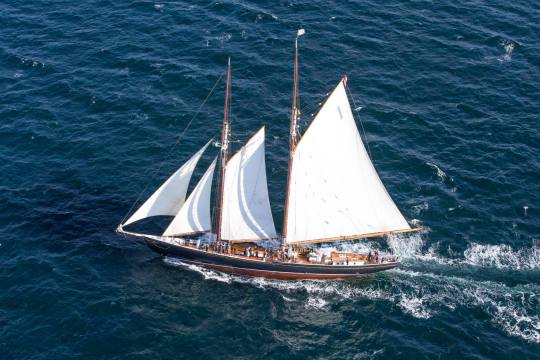
Bluenose II
More about her history here:
#naval history#naval artifacts#tall ship#bluenose II#bluenose#schooner#early 20th century#age of steam replica#day 11#advent calendar
94 notes
·
View notes
Text
Highwayman According to De's Characters
I was a highwayman

Along the coach roads I did ride
With sword and pistol by my side
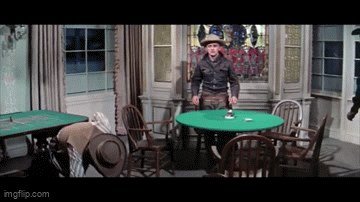
Many a young maid lost her baubles to my trade
Many a soldier shed his lifeblood on my blade
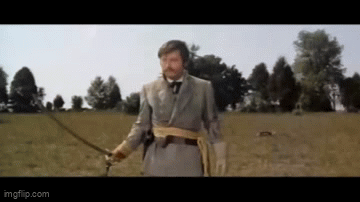
The bastards hung me in the spring of '25
But I am still alive

I was a sailor

I was born upon the tide
With the sea I did abide

I sailed a schooner 'round the Horn to Mexico
I went aloft to furl the mainsail in a blow
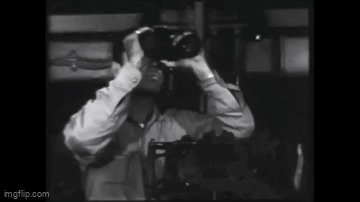
And when the yards broke off they said that I got killed
But I am living still
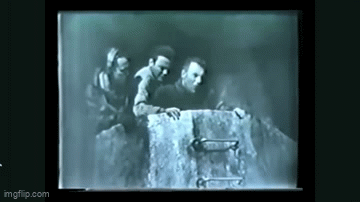
I was a dam builder
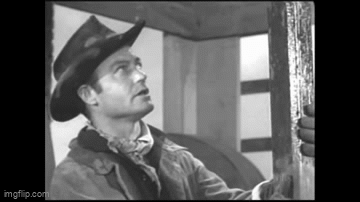
Across the river deep and wide
Where steel and water did collide

A place called Boulder on the wild Colorado
I slipped and fell into the wet concrete below
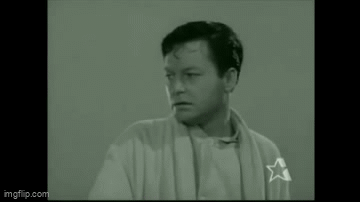
They buried me in that great tomb that knows no sound
But I am still around
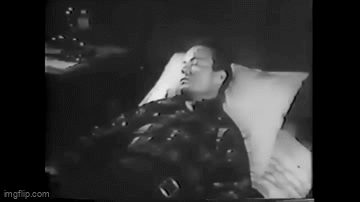
I'll always be around, and around and around
And around and around and around and around
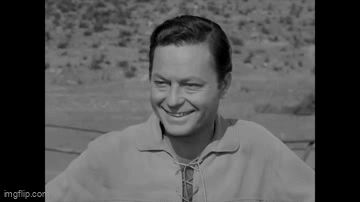
I'll fly a starship

Across the Universe divide
And when I reach the other side
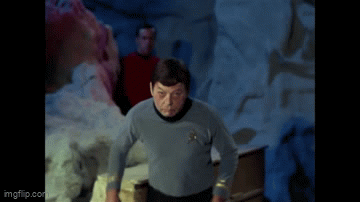
I'll find a place to rest my spirit if I can
Perhaps I may become a highwayman again
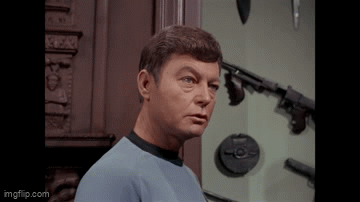
Or I may simply be a single drop of rain
But I will remain

And I'll come back again, and again
And again and again and again and again
And again

#deforest kelley#the world according to de's characters#the highwayman#the highwaymen#mackenzies raiders#warlock#raintree county#bat masterson#time to kill#navy log#silent service#studio one#you are there#the virginian#the lone wolf#frozen escape#death valley days#search for spock#city on the edge of forever#a piece of the action#journey to babel#the undiscovered country
48 notes
·
View notes
Text
TF141 as Lyrics
Song : Highwayman by The Highwaymen
(Listen to song as you read for optimal experience)
Soap:
I was a highwayman, along the coach roads I did ride
With sword and pistol by my side
Many a young maid lost her baubles to my trade
Many a soldier shed his life blood on my blade
The bastards hung me in the spring of '25
But I am still alive
Gaz:
I was a sailor, I was born upon the tide
And with the sea I did abide
I sailed a schooner 'round the horn to Mexico
I went aloft to furl the mainsail in a blow
And when the yards broke off, they said that I got killed
But I am living still
Price:
I was a dam builder across the river deep and wide
Where steel and water did collide
A place called Boulder on the wild Colorado
I slipped and fell into the wet concrete below
They buried me in that gray tomb that knows no sound
But I am still around
I'll always be around and around and around
And around and around and around
Ghost:
I'll fly a star ship across the universe divide
And when I reach the other side
I'll find a place to rest my spirit if I can
Perhaps I may become a highwayman again
Or I may simply be a single drop of rain
But I will remain
And I'll be back again and again and again
And again and again and again
#call of duty#cod#flowerwrites#captain john price#john price#john soap mactavish#soap#johnny mactavish#soap mactavish#kyle gaz garrick#Gaz#gaz cod#kyle garrick#Simon Riley#simon ghost riley#cod ghost#ghost cod
20 notes
·
View notes
Note
🦙 a character sees a creature in real life for the first time
Does this mean I get to share the Wandering Isle?
Then the creature breached behind the schooner, gifting us the horror of its face.
“Throw the light,” Lucient whispered, hand firm on the mast, eyes on it.
But I didn’t move; standing in front of the cabin entrance I could only stare. It kept pace, somehow it kept pace, always just behind us despite our speed. And it did so without appearing to move, as if it were anchored to us. And it was nothing known, nor of a comfortable oddity as some sea beast grown too large yet still understood on some level.
What chased us was altogether alien and terribly familiar.
Cave wide, its eyes were lit with man-sized fires but its face bore a delicate, oval sweetness with a serene smile on lips that looked far too human. Yet it was no man, no flesh and blood creature either. It was rock and sea and fire. Ocean water poured from its head as it rose higher, as waterfalls of hair it was, glistening in the moonlight and the peculiar orange flames of its eyes. Higher it rose, allowing the sight of a slender neck and what struck me as islands on their own on either side until it tilted that impossible head and those islands shrugged ever so slightly.
“Throw the light,” Lucient whispered again, hissing it at me.
I couldn’t speak, couldn’t move. The thing looked like a mountain, or a woman carved out of one, ready to speak to us, or eat us—a simple task with how large its mouth was. And it continued to keep pace without appearing to move, beyond blinking and tilting its head, as if intrigued by us—studying us. The sheer size of its face prevented seeing anything behind it, but surely it had to have a body attached somewhere. And as I wondered of it, my thoughts filled with soft fingers.
My love, Lucient prodded, she wants our light, but if I move to take it from you she will scream. We do not want her to scream. Throw. The. Light.
Mechanically, I snapped my arm back and chucked the wisplight off the side of the ship—realizing in that motion that her mouth was wider that the schooner, her eyes at least as tall as its mainmast. But I didn’t have the chance to worry too much of that as she swooned with the splash of that lamp in the water.
A harrowing wail through a deep cave that sound, and it brought a breeze and a wave with it as she sunk back into the black. We weathered the wave, schooner moving too quickly by then, but I kept my eyes stuck on where I thought she was. Too black that sea, too matching her rock, but I could follow the eyes—still burning beneath the water.
Then the mountain woman reached for the lamp floating uneasily on the rippling shadows and the sight of those fingers, massive and rocky as they were, reminded me of the horrid Sea Witch’s island. She sunk deeper after, with only the glow of her eyes to remind me she lingered, and Lucient pulled me into a hug before I found breath to scream.
“You really haven’t been out to sea, have you, my love?” he asked through kisses on my neck.
I didn’t appreciate the mockery, or the insinuation that ours was a normal interaction to have in the open ocean; I’d read plenty of tales, heard more from sailors, and never any mention of her, “Maybe it’s for the best if that’s out here.”
->Taglist<-
// feel free to ask to be added or removed ^.- //
@watermeezer @starbuds-and-rosedust @thespacelizard
@your-absent-father @mr-orion @cowboybrunch @olliexwrites
#asks#snippet share game#before deluca#she is my most favoritest creature#and I will put her in everything I possibly can
7 notes
·
View notes
Text
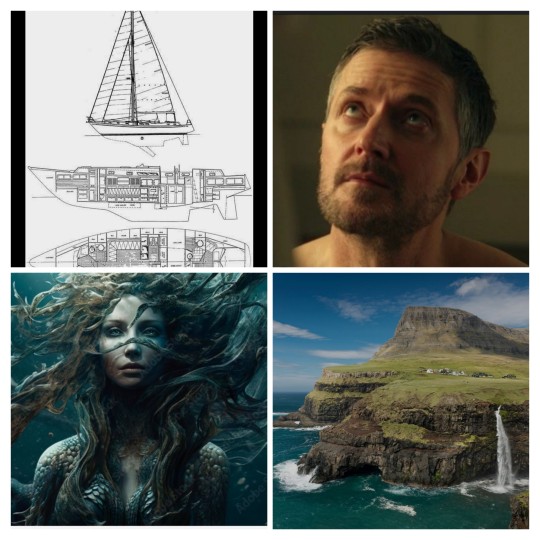
Title: The Faroe's Curse
May 1st : Selkie (Scottish mermaid) Prompt 18+
Characters: William Farrow and OC Selkie (Delphine)
(William Farrow developed by Josephine Hart "Damage")
Word count: 3.4k (total in 2 parts)
Warnings: near drowning, sailing, mermaids/selkies (dark siren), Female receiving, height sameness, female rescuing male, fisting, sex, character death.
Fandom: Richard Armitage - Obsession
Obsession - Post series: William takes some time off work and home and decides to go on a boat excursion to the Faroe islands west of Scotland, to reflect on his family's origin.
History: A Selkie according to legend is a Scottish/Nordic derived mermaid of sorts. A women’s form with “seal’s” tail but can shapeshift at will and are thought to be incredibly attractive and captivating creatures. In the Scottish tradition, they are often alluring and can said to grant wishes, before leading to an untimely death. In Norse myth, the Margyge are said to be dangerous and vicious creatures that conjure storms to lure seamen, clawing ships to capsize them, and drag the men out of the boats to a watery grave.
Definitions: (merfolk translator – twilightrealm.com)
Verdant Eddy – green, vibrant vortex
Ed aib gehi – Oh yes more
Uzz gil gobp bojjih pdi bugi jupi – All men must suffer the same fate
Gil uhi bowd bygqzi whiupohib – Men are such simple creatures
Far off the Coast of Scotland sat a boat, adrift in the icy and murky waters of the North Atlantic Sea. The circulating waters moving the 42’ sailboat about in high winds. William was unconscious on the bough. A gorgeous and naked woman hovered above him, wet from the seawater. She cradled him against herself and whispered an enchanting tone in her native tongue. William stirred and looked up into icy green eyes and a smooth face. He smiled, then froze remembering how moments ago he had been thrown overboard and was drowning. He coughed up some sea water, its saltiness burning as it forced its way out of his lungs and through his mouth and nose. She patted him gently on his back. He sat up, noticing her nudity. The Selkie’s skin, glowed green and grey, and glistened even in the grey skies. William scurried back a moment, not sure what he was looking at. The Selkie cooed, “Its alright. I am not here to hurt you”. William gulped nervously, “Good thing”, he nervously laughed, scratching the back of his neck, “Did you get me back onto the ship?” He asked her. The Selkie nodded, and looked down, it was then that he truly noticed her breasts and crease of her belly running down to long legs, and delicate feet. She was, in a way, remarkably beautiful. He felt entranced a moment, then tried to shake it off. He tried to stand and fell back on his bum, his legs folding beneath him, “I’m sorry, (chuckles) I must not yet have my bearings back”. The selkie spoke then, “Its alright”, the voice was a bit broken, and raspy.
Below from the midpoint of the schooner, a male voice shouted out towards William. William suddenly grabbed a blanket from the seating compartment and tossed it over the woman. Donald stood a bit above the hatch, and looked towards the bough, “William, are you alright?” he said in his Northumberland brogue. William nodded quickly, “yeah, yeah. Just getting my bearings”. “We thought we lost ya”, Donald said. William turned toward the Selkie, whose eyes were cloaked in the blanket now, looking at him. “Yeah, nearly” a lighthearted chuckle, “Is everything good down there?” he shouted back over the wind. “Oh yeah, no worries. We will be back on a track in about 30 minutes or so, the current shifted on us, with that last storm”. William nodded and waved at him. The Selkie looked at him tentatively, William came to her, and started to rub her dry, absently, not sure what to do with such a, woman? Her dark hair was tendrilled with seaweed and peppered with salt from the deep water. He looked into her emerald eyes again and lost his breath. When his breath returned he asked, “What is your name?” The Selkie smiled, “Delphine” she said, her throat warming to the open air again. William noticed that she was nearly as tall as him, her long legs lying well past the woolen blanket. Delphine did not shy away, as his hand moved to touch her ankle, and caressing it lightly. He shook his head, “I’m sorry. I shouldn’t have” William said. Delphine looked at him, “Its ok. I know you have never seen my kind before. It can be quite shocking”. William’s brow furrowed, “Your kind?” he looked inquisitive.
Delphine slid off the seat and onto the bough planks. She stretched her legs straight and hummed a little tune. William watched her legs transform into a silken grey flipper, and his hand went over his mouth, as she took his other hand and slid it along her tail. William was entranced again, the sparkle of her skin, a beautiful grey-green resonated, as he touched her he felt the warm and cool of it and shuddered. He had an impulse to just taste her, but he didn’t know why. William sat down across from her, and just stared. Delphine, giggled, closed her eyes and rubbed her at her seal skin into legs again. Her female sex now showing as the blanket over her shoulders shifted, and William’s cock twitched almost instantly. Then a thought struck him, which he didn’t say out loud (what if they find out? How will I explain her on the ship?)
Delphine looked at him, shrouding the blanket across her flesh, “You seem puzzled”. William looked at her, “I am. I’m not sure how to keep you on board, but I want to,” smirks. Delphine looks down, “I understand, maybe we can come up with a story together? Were the others up here when you fell?” William grimaced, “Other, there’s only one man down there. But no, he was not”. Delphine smiled broadly, almost sinister, her glow seemed to brighten then, as she showed her sharper teeth. William shuddered again, titillated and frightened. “You speak quite well for a, mermaid, is that what I call you?” Her dialect had a slightly Nordic lilt, “No, I’m a selkie, half man, half seal. Our kind has traded with men for centuries, so its best to be able to communicate”. William thoughtfully paused. He couldn’t look away from the flesh that was exposed by the woolen blanket, “I see, sorry for the confusion then”. Delphine ignored the apology. His eyes continued to dart back and forth with hopeless abandon. Delphine knew she had her mark. “What’s your name?” Delphine asked. William snapped out of his fixation a second, “William, Farrow” Delphine smiled, “Of the Faroe isles?”
William smiled, “Rumored to be, yes” rubbing the back of his neck to wipe away the sweat that was building there. Delphine now moved to stand, a little unsteady on her feet, William stood to help her. She smiled, nose to nose at him, meeting his height. “I’ve never met a woman as tall as me” he said, wrapping his arms around her waist, the blanket maintaining its position. Delphine, “not many have either, I have found”. William formed an ‘oh” with his mouth, and Delphine kissed him, her arms lazily around his neck as they both stood on the deck, the waves settling down around them. William returned the kiss, wanton and sweetly. Delphine licked his bottom lip, her razor-sharp teeth, dragging along it seductively for a moment. William groaned in “
From the observation window Donald saw William and a woman kissing and blasted the horn, causing them both to fall apart, crashing onto the deck. Donald came up on deck and looked at William first before he gazed upon Delphine with suspicion and intrigue. Her long naked legs, against the deck, and nothing else covering her but the woolen blanket. “Now what’s all this? William, what’s going on?” Donald said, perturbed. William guffawed looked up at Donald, as he made it to his feet, “I... I went overboard to retrieve this woman, (looked at Delphine) floating in the water, and” Donald cut in, “And you suppose you needed to resuscitate her while standing in my viewing window, is that it?” he said sarcastically. William put his hands up, “I meant no offense Donald, obviously. I just, I” Donald snapped back again, “Well, anyways, no harm done, right? Hello lass, its nice to meet you. I am Donald, captain of the Verdant Eddy welcome abroad” Donald tipped his hat to Delphine and she smiled closed mouth at him, “Thank you, sir. Captain. I am Delphine”.
William needlessly stood next to her, a subtle claiming of territory, his hand making it to the small of her back. “How did you get out here?” Donald asked her. Delphine looked out to the sea, in a longing fashion, and pointed exactly where land existed about 10 miles ahead, “We were coming off the isles, and capsized, I have been adrift for days it seems. Used most of my clothes to lash together a raft, but eventually that succumb” Delphine looked down sheepishly, “I must look an awful mess, my apologies”.
William shook his head in time with Donald’s response, “No, no. of course not. Listen that is quite an ordeal, is there anyone I can radio for you?” Delphine looked up then, a bit panicked, William spoke up, “She was the only survivor”. Donald grimaced, “I’m sorry lass. But I’ll bet your hungry.. huh. I’ve got some good grub downstairs in the galley. Come on” Donald invited, Delphine walked cautiously away from William and towards Donald. William followed after them, stepping down into the lower section of the boat, trying not to bang his head on the ridge of the hatch. Donald was chipper and rattled off things, as Delphine sat down in the galley. William went the back, to his sleeping quarters and ruffled through his suitcase trying to find some sweats and a shirt for her. Delphine sat quietly watching both men fuss over her, she giggled under her breath. Men were so easy. (and so tasty, she thought)
Donald busied himself at the counter, preparing her a sandwich with fish and sauce, as Delphine watched. His Northumberland accent thickening in places, “Your lucky you didn’t get eaten out there pet” Delphine, “Yes, I am very grateful.. is this boat yours, captain?” Donald nodded not facing her, “Yep sure as the sun sets she is. Bought and paid for. And still kicking about. Now I just do these small charters, takin’ Rich men around, (pointing a butter knife towards Williams’ quarters) wherever they wanna go (chuckles) though that one, is strange for sure, haunted I think”. Donald turned to place the food in front of Delphine, who looked at it expectantly.
“I would retire,” Donald paused, “But no one to retire with, you know. My wife, god rest her, passed away about 10 years ago now, no little ones neither,” he trailed off as William re-entered the galley and sat next to Delphine. “You got one for me, Captain?” William asked, looking towards the sandwich. Delphine pushed hers towards William, “Its ok, William, you can have mine”. Donald huffed, “I insist you eat something lass, get your strength back, you look like you’ve lost a stone since you hit the water”. Delphine dutifully took a bite of the sandwich knowing this to be a custom of men. Donald smiled, “That’s a good girl, (to Delphine) now, what about clothes, William?” William handed the bundle of clothes he had found and laid it next to Delphine on the seat. “Sorry I didn’t have anything better, my, (pause) ex-wife didn’t pack my suitcase.” Delphine smiled shallowly at both men. It was almost too easy, two men with no one to look after them when they go missing, Delphine thought. Delphine took another bite of the sweet fish, her soft pink tongue lapping at her lip at bit, Donald missed it, but William was enthralled. “There you are boyo,” Donald handed William a sandwich and went up to the deck. William nodded, and looked oddly at him, before Donald left them alone in the galley.
William, “So, how, um, well old are you?” Delphine, looked at him, clearly thinking, “Well by your standards I would be about 30, I suppose (She looked down at her soft abs and bouncy breasts) But I am 150 storms old”. William looked inquisitive, “Storms? Is that your only method of time measurement?” Delphine, “The larger parts yes. Its darker where I live, and the agitation brings things around, but I can survive up here, for a little while”. She smiled sweetly. William handed her the bundle of clothes, “Listen you can get dressed in my quarters, and feel free to clean up, if you wish,” smirks, “I will stay out here”. Delphine stood, and walked towards his quarters, “You think I’m suddenly shy, now?” William rose immediately, “I was trying to be respectful” cleared his throat into his fist. “Your respectful customs do not interest me, but I am curious about what other things men can do”. Taking that as a challenge in acceptance, William gulped again, “I am happy to oblige, ask me anything you like”. Delphine, walked away, swaggering her bum under the blanket, “Its something you’ll have to show me”.
@scariusaquarius a @fizzyxcustard @legolasbadass
Thanks to the lovely people that have been so encouraging!!
Lyn's Writing Event 2024!
#richard armitage#William farrow#smut#mermaids#selkie#fanfiction#dark siren#myth lore#monster x human#sailing#OC x Richard Armitage character#lyns writing event 2024
7 notes
·
View notes
Text
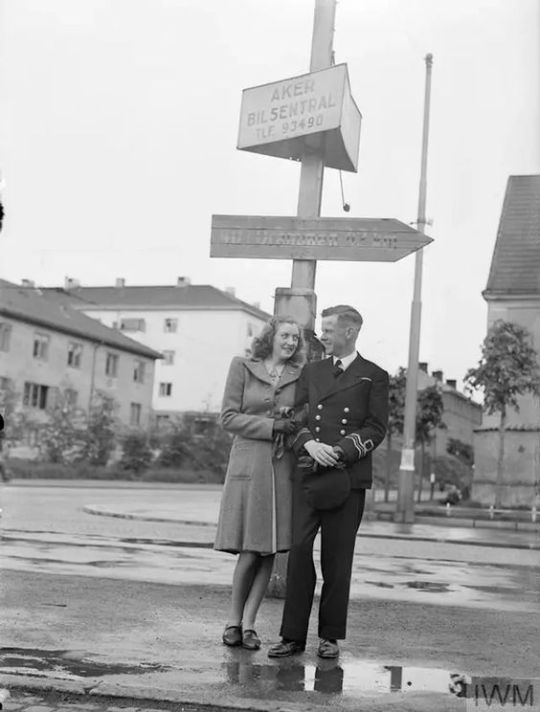
The maverick heroics of MI6 agent James Bond may actually be based on the true story of one brave soldier, who took on the Germans and won again and again. In this archive piece, we look back on Patrick Dalzel-Job's stranger-than-fiction life
If the dashing hero of Ian Fleming's best-selling spy thrillers were among us, is it likely he could be found living alone on a far-away hill by the sea in Scotland?
A mildly spoken gentleman who lived to his eighties, then grey and a little stooped—could he have been secret agent 007? Come on.
Ah, but life is stranger than fiction.
Some of those who know best have always believed that Fleming based his superspy on a wartime comrade named Patrick Dalzel-Job—yes, our elderly gentleman who lived his final days in the Highlands.
There were other influences, of course. Bond's love of vodka martinis and handmade cigarettes came, in fact, from Ian Fleming himself; and whereas 007 tumbled into bed with a different beauty every few pages, Patrick Dalzel-Job (pronounced Deal-Jobe), loved only one woman all his life.
But there is something here. Consider:
Job, like Bond, was half Scots, a one-time naval officer, a master of languages who in real life performed precisely the kinds of derring-do Fleming later attributed to his flamboyant make-believe hero.
By the time Dalzel-Job walked into Commander Ian Fleming's Admiralty office one day in 1944 looking for a new assignment, he had already seen service as a seaman, commando, submariner and spy, and had just become probably the first naval officer to qualify for army parachute wings.
Fleming, an ex-journalist who had broadcast his intention of becoming a best-selling author some day, was then building up the clandestine army of naval intelligence officers and Royal Marine commandos which was to move out in front of the assault troops on D-Day and capture secret enemy documents and weapons.
He saw in Patrick's flinty blue eyes the look of a man whose mettle has been tested, and promptly signed him on.
Says veteran BBC broadcaster Charles Wheeler, who served with both: "Who could be surprised if a kind of James Bond seed were planted then and there?"
An unconventional childhood
Patrick Dalzel-Job, born in Twickenham, Middlesex, in 1913, was three years old when his father, an infantry officer, was killed in France. His mother, a small, spirited woman, brought him up alone.
They lived on the Sussex coast, then moved to Berkhamsted in Hertfordshire, where Patrick went to school. But he was a sickly boy, inept at team sports and home with mysterious bouts of fever more often than he was in class.
When he was 14, his mother took him to Switzerland, where the mountain air restored his health and he became an expert skier. He continued to read widely in French and English, but his formal education was over.
Drawn to Norway by stories he'd read as a boy, in 1937—the summer of his twenty-fourth birthday—he set sail from Scotland in a 37-foot schooner, Mary Fortune, whose deck work and interior he had built himself.
With his mother as crew, he spent the next two years exploring a wilderness of fiords and islands from Bergen in the south-west to Nordkapp, on the northernmost coast of Europe.
His mother knew nothing of seamanship, but an ingenious array of ropes, chains and pulleys enabled Patrick to man the rugged little schooner single-handed.
Soon he was speaking Norwegian like a native and making friends up and down the western coast. A deep-rooted love for Norway and its people became a cornerstone of his life.
Falling in love with Norway
Wherever he sailed through the complex of waterways, he drew detailed charts, convinced they would be of use to the Royal Navy if war came. But when he sent them to the Admiralty, they were accepted with indifference.
And three years later, when the Germans invaded Norway and coastal charts of any kind were desperately needed, his could not be found.
Meanwhile Patrick, preparing the Mary Fortune for a voyage north to the Arctic Ocean, decided he needed another hand on board and turned to friends in Tromso, the Bangsunds: might one of their children be interested?
The keenest was 13-year-old Bjørg, with her wide blue eyes and a laugh that was the most beautiful sound Patrick had ever heard.
All through that spring and summer, Bjørg was a valiant and valuable shipmate, cheerfully helping out in the galley and learning how to handle the tiller. Then, in early September, their radio brought news that the war had come.
Mary Fortune headed back to Tromso, where all the Bangsunds came to see off Patrick and his mother, their possessions reduced to what they could carry in two suitcases, on the coastal steamer.
As the ship ploughed through the night towards Britain, Patrick found a scrap of paper from Bjørg under his pillow. "I love you," it said.
The nazis and the Norwegians
In April 1940 Patrick, now an officer in the Royal Navy, was again bound for his beloved Norway.
The Nazis, in a brutal move to assure command of the northern sea lanes, had invaded their neutral neighbour, and an Allied expeditionary force was steaming north in an attempt to dislodge them.
Patrick was assigned the task of disembarking the troops at Harstad, 150 miles north of the Arctic Circle, and conveying them to combat staging areas.
This he did by organising fisherman friends, and their friends, into a flotilla of more than 100 of their boats. The objective was nearby Narvik, an ice-free port seized by the Germans as a base from which to protect their supply of vital iron ore from neutral Sweden.
The Norwegians did as Patrick said because they trusted him and he spoke their language; also because he never hesitated to fire a round from his father's old service revolver across their bows when they forgot this was war and not just another fishing trip.
Wearing an unmarked greatcoat over his sub-lieutenant's insignia and barking orders as if born to command, he even had senior officers calling him "Sir".
The Allies captured Narvik—but held it only briefly. They were too few and had come too late. By the end of May, all but a small force had been withdrawn. No one doubted that Luftwaffe bombers would soon be rumbling across the sky, aiming to drive off the rest.
A daring rescue
On May 29 Patrick, standing offshore of the town with his ragtag fishing fleet, learned to his horror that no provision had been made to evacuate the townspeople.
His urgent enquiries only prompted a stern message from force headquarters: he was to hold his boats in reserve and not—"repeat not"—concern himself with the civilian population.
At midnight, a crisis meeting of the city council was still agonising about how they could evacuate the people to the designated safe areas. The then mayor, Theodor Broch, tells what happened next:
"There was a commotion by the door. A young Englishman said he had to talk to me, that we had to evacuate the town. I barked at him that we had no boats."
"I have the boats," said Patrick. "Let's go."
His providential appearance in defiance of strict orders; that clipped self-assurance; rescuing the population of a doomed city—what could have been more James Bondian?
Within the hour, under Patrick's close supervision, women and children were being handed down into the boats.
"I have never forgotten him," says Gerd Carlsson, who was 21 and boarding with her sister and baby nephew. "There was shooting from land and sea, and lines of waiting people, and such a babble of shouting. But he shook each person's hand warmly and was so calm that although I didn't even know where I was going, I wasn't afraid."
During the next two days and nights, 4,500 people were ferried to safety in dozens of communities along the surrounding waterways.
Early on June 2, Patrick and Mayor Broch walked together through Narvik's empty streets, making sure no one was left behind. By then, even the last of the troops had slipped away.
But hours later, while Patrick was still there, the bombers came, turning the town's neat wooden buildings into an inferno, reducing most of them to splinters and ashes.
Patrick watched as Narvik burned, heartsick because he knew there was nothing in the town of military value, only people's homes.
Wartime intelligence
On June 8, Patrick went back to Britain, disillusioned by the Allied defeat, bitter that he hadn't managed to stay behind and organise a Norwegian resistance—and dreading a message from the Admiralty that he was to be court-martialled for gross disobedience of orders at Narvik.
Instead, the Admiralty signalled him with a message from King Haakon VII of Norway: His Majesty would be in London shortly and he would personally present Lieutenant Dalzel-Job with the Knight's Cross of St Olav, Norway's highest order, for saving the people of Narvik.
After that, nothing was heard about a court-martial. But Patrick was relegated to a series of converted merchantmen that zigzagged across the South Atlantic intercepting blockade-breakers or convoying Allied freighters safely to port.
"All this", he recalled in the book he later wrote (and published) about his adventures, "seemed terribly monotonous to me."
Just as he began thinking the war had passed him by, Lord Louis Mountbatten summoned him to London and put him in charge of motor torpedo boat (MTB) operations in Norway. It was particularly dangerous work, for the Germans were throwing all they had into defending Norway's coast.
But Patrick knew plenty of narrow entrance channels that the Germans didn't. His MTBs raised havoc with commando raids, sabotage and attacks on enemy ships.
It forced the Germans to step up defensive operations and induced trepidation quite out of proportion to the number of MTBs employed against them.
Still only a lieutenant, Patrick was next posted to a detachment of midget submarines. In September 1943, he briefed their four-man crews on the remote Arctic estuary where the German battleship Tirpitz was moored in apparent safety; three of the tiny craft crept into the fiord and crippled her in a raid that earned VCs for two of the participants.
Next, equipped with a radio transmitter, he was put ashore on a Norwegian island, on a one-man intelligence mission to track supply convoy patterns through the inland waters.
He knew that capture meant summary execution, on Hitler's own orders. Yet he remembers those three weeks, alone and utterly dependent on his own wit for survival, as among the most exhilarating of his life.
Taken off the island by pre-arrangement, he assuaged his reluctance to leave by directing the MTB that picked him up to a German merchantman whose anchorage he had noted. Two torpedoes finished her off.
James Bond rises through the ranks
On June 10, D-Day-plus-4, Patrick landed on Utah beach in Normandy as a member of Commander Ian Fleming's intelligence hit squad, the 30th Assault Unit (30 AU)—a name intended to mislead, since it was never meant to assault anything and probably took its number from an office door in the Admiralty.
Patrick, promoted to lieutenant-commander, was in command of Team 4, reporting by courier directly to Fleming.
All the way through Normandy, Belgium and into Germany, Team 4 operated ahead of the assault troops in enemy-held territory, getting their hands on German documents, weapons and installations before they could be destroyed by the Germans or by Allied artillery.
Patrick revelled in it; this kind of war, where he was free to set the level of risk, was the kind he wanted to fight. And he sent back a steady stream of data and captured equipment.
He found the control centre for the long-range bombing of Allied convoys in the Atlantic; he recovered intact a new and dangerously effective midget submarine; reaching Cologne 24 hours before any other Allied troops, Team 4 walked unhindered into the vast Schmidding metalworks and took it over.
Patrick's audacity was sometimes breathtaking. When some nuns showed him a heavy safe used by the Germans, he promptly blew it open, breaking every window in the convent. He gave the money in the safe to the nuns for repairs and sent the documents in it to London.
His reports from the field to the desk-bound Ian Fleming kept fleshing out a portrait of the kind of man the would-be writer was conjuring up for his fictional hero. But Patrick's most stunning exploit was still to come.
An impossible stunt
The target was the vast Deschimag shipyard in Bremen where, he had heard from prisoners, there could be as many as 20 of the newest high-speed German submarines—a prize of enormous intelligence value.
But winning it would be a race: the 52nd Lowland Division, following on close behind 30 AU, was planning on blasting the shipyard into oblivion.
In the afternoon of April 26, 1945, Team 4 entered Bremen's deserted central square. A fretful policeman appeared. Please, he said to Patrick in the lead Jeep, would the commander accompany him to the city hall where the mayor was waiting?
Patrick found the mayor, dressed in formal black, alone in the empty, echoing chamber.
"He wanted me to accept the surrender of the city of Bremen and all its services," Patrick recalled, "and he gave me assurances of vigorous police action against any who failed to co-operate fully."
Patrick went at once to radio Army Command that organised military resistance was ended and whatever the Allies wanted would be done. "I told them that, except for some sniping, the city was secure. They didn't have to shell the shipyard."
But the Army did not see it that way. They were going to open fire that very evening, they replied, as soon as they came within range.
Furious, Patrick climbed into his scout car and set out alone for the shipyard, staking his life that there really was no resistance there, and that his presence would keep the Army from shelling it.
Then, at the very gates of the shipyard, his scout car sputtered and died—it had run out of petrol. And when he tried to radio for help, all he got was static; contact had been cut by interference from surrounding buildings.
It's like a bad film, Patrick remembers thinking. But what would happen in the last reel?
He considered going ahead on foot, but needed the rest of his team with the radio truck. Without it, how could he tell the Army he was inside the shipyard? He would only get killed there.
Spotting some workers, he grabbed a bicycle from one of them. Frantically he pedalled back through the sunset to his unit—aware that there was still enough daylight for a sniper to put a bullet in his back.
When he rounded the last corner, his anxiously waiting men hauled him on board the lead vehicle, bicycle and all, and the column sped off for the shipyard at breakneck speed.
Inside, they found 16 brand new submarines and two destroyers, and forestalled their imminent demolition by the shipyard technicians and directors.
Patrick and his men took them all prisoner, and in a night-long search found technical papers detailing the most recent German naval research, as well as machine tools of highly advanced design.
They had not heard the last from the Army. Early next morning, when submarine experts had already begun a detailed study of the captured U-boats, all of the new high-speed Type 21, a British Army staff officer appeared and asked Patrick to sign a receipt for them—implying that the 52nd Division had captured them.
This was the last straw for Patrick. He slammed the gate and had a sign posted on it to the effect that the entire shipyard was the property of 30 AU: "Keep Out!"
Bond gets the girl
The war ended soon after. Patrick never saw Ian Fleming again, nor did the British government reward his wartime valour with even a single honour or citation.
Among those who still wonder why is Rear Admiral Jan Aylen, then a Commander in 30 AU, who calls Patrick "one of the most enterprising, plucky and resourceful people that the Second World War produced".
The reason is not complicated. Frequently Patrick committed the unforgivable offence of disagreeing with senior officers and, worse, being proved right.
Just like James Bond.
As soon as the fighting ended, Patrick responded to the great hunger in his heart and returned to Norway.
Six years had passed; Bjørg was 19 now, a different person. He was different. But as soon as they saw each other, they knew they had only been marking time. They married three weeks later.
The James Bond years, about to begin for Ian Fleming, were over for Patrick. He and Bjørg went to Canada, where Patrick served in the Canadian navy and their son lain grew up.
In 1960 they settled near Plockton in the West Highlands, prepared to continue living happily ever after. Patrick taught in the village school and Bjørg became a pillar of the community until her death, in 1986, of cancer.
Patrick, brave as ever, soldiered on alone. He finally passed away in 2003.
Daily inspiration. Discover more photos at Just for Books…?
11 notes
·
View notes
Text
youtube
"Diving into the Wreck" by Adrienne Rich ‖ Tom Hiddleston (12/10) [without music]
This is a re-upload of Tom reading poetry for Ximalaya FM from 2019 without the background music.
"Diving into the Wreck" by Adrienne Rich
First having read the book of myths,
and loaded the camera,
and checked the edge of the knife-blade,
I put on
the body-armor of black rubber
the absurd flippers
the grave and awkward mask.
I am having to do this
not like Cousteau with his
assiduous team
aboard the sun-flooded schooner
but here alone.
There is a ladder.
The ladder is always there
hanging innocently
close to the side of the schooner.
We know what it is for,
we who have used it.
Otherwise
it is a piece of maritime floss
some sundry equipment.
I go down.
Rung after rung and still
the oxygen immerses me
the blue light
the clear atoms
of our human air.
I go down.
My flippers cripple me,
I crawl like an insect down the ladder
and there is no one
to tell me when the ocean
will begin.
First the air is blue and then
it is bluer and then green and then
black I am blacking out and yet
my mask is powerful
it pumps my blood with power
the sea is another story
the sea is not a question of power
I have to learn alone
to turn my body without force
in the deep element.
And now: it is easy to forget
what I came for
among so many who have always
lived here
swaying their crenellated fans
between the reefs
and besides
you breathe differently down here.
I came to explore the wreck.
The words are purposes.
The words are maps.
I came to see the damage that was done
and the treasures that prevail.
I stroke the beam of my lamp
slowly along the flank
of something more permanent
than fish or weed
the thing I came for:
the wreck and not the story of the wreck
the thing itself and not the myth
the drowned face always staring
toward the sun
the evidence of damage
worn by salt and sway into this threadbare beauty
the ribs of the disaster
curving their assertion
among the tentative haunters.
This is the place.
And I am here, the mermaid whose dark hair
streams black, the merman in his armored body.
We circle silently
about the wreck
we dive into the hold.
I am she: I am he
whose drowned face sleeps with open eyes
whose breasts still bear the stress
whose silver, copper, vermeil cargo lies
obscurely inside barrels
half-wedged and left to rot
we are the half-destroyed instruments
that once held to a course
the water-eaten log
the fouled compass
We are, I am, you are
by cowardice or courage
the one who find our way
back to this scene
carrying a knife, a camera
a book of myths
in which
our names do not appear.
Source: Ximalaya FM
#Tom Hiddleston#“Diving into the Wreck”#Adrienne Rich#poem#poetry#p-isforpoetry#audio#Ximalaya FM 2019#Youtube
7 notes
·
View notes
Text
Dracula and the Law: Who Owns the Demeter? Part I
One young law student is loudly asserting that the rights of the owner are already completely sacrificed, his property being held in contravention of the statutes of mortmain, since the tiller, as emblemship, if not proof, of delegated possession, is held in a dead hand.
Between August 6th and 9th, the doomed cruise of the Demeter comes to its tragic conclusion, finally arriving in Whitby. But what, exactly is to be the fate of the ship itself? Let's set the stage and find out.
On August 6th, a Coastguard representative spots the Demeter from the cliffside, noting its strange behaviour.
"I can't make her out," he said; "she's a Russian, by the look of her; but she's knocking about in the queerest way."
On August 8th, a dramatic and sudden storm rises in the North Sea and Dracula makes his dramatic landing in England, shrouded in fog and storm.
The wind suddenly shifted to the north-east, and the remnant of the sea-fog melted in the blast; and then, mirabile dictu, between the piers, leaping from wave to wave as it rushed at headlong speed, swept the strange schooner before the blast, with all sail set, and gained the safety of the harbour. The searchlight followed her, and a shudder ran through all who saw her, for lashed to the helm was a corpse, with drooping head, which swung horribly to and fro at each motion of the ship. No other form could be seen on deck at all. A great awe came on all as they realised that the ship, as if by a miracle, had found the harbour, unsteered save by the hand of a dead man!
The Coast Guard are the first to board the ship, securing it after Dracula has left.
------------
Human civilization has always had a deep, multifaceted connection with the sea, and the rights of Maritime Salvage are one of the most complex and evolving reflections of this. Let's take a look at the history, and play around with Dracula's landing a little bit across a few posts...
10 notes
·
View notes
Text
Whumptember 2023, Day 22
“I’m getting bored”
Captive whumpee | New whumper | Electrocution
The Bee's Whumptember Masterlist
~1570 words
CW: thunderstorm whump, drowning, implied character deaths
------------
A clash of thunder rocked Youngest to their core, just as another wave slammed into the side of and under the sailing schooner, tilting Youngest off their feet and into the nearest wall. Then it righted itself again and tilted the other way just as hard, toppling them to the water-slicked floor with an angry shout, unable to find their footing as the raging storm outside continued to toss the ship this way and that.
Boisterous laughter sounded out even about the pounding rain. “You having a good time there, Youngest?” Crewmate shouted from their furiously swinging hammock, seemingly unfazed by the rocking. They lounged with their arms behind their head and half-lidded eyes twinkling at their newest crewmate’s struggles.
Youngest’s hand finally found purchase on one of the wooden ribs of the ship. They clung to it with their hands and knees for dear life. “Just great!”
More laughter from the various crewmates around the gallery. At least they were having a good time. A headache drove a spike through their brain and slight nausea rained a mist of dread over their consciousness. They attempted to stand again, but the floor under them rocked once more and Youngest toppled right into Carpenter's lap. A dark leaden tear streaked across the paper of their half-finished blueprint, accompanied by an “Oooh!” and some compassionate hissings and groans.
“Sorry, sorry!” Youngest yelled as they scrambled back to their feet once more.
Carpenter stared at their ruined drawing, mouth pressing into an unamused line. They let out a deep sigh through their teeth.
“Get your shit together, Youngest.” they huffed, somehow still audible over the pounding rain above and all around them. “This isn’t the last storm you’ll see out here, and it certainly won’t be the worst.”
"You're so rude!" Crewmate screamed good-naturedly from across the gallery. They fumbled in the hammock until their feet hit the floor and made their way expertly across the ever-tilting floor. "It's their first time, they haven't got their sea legs yet! And we all know what that means!"
The crewmembers within earshot looked at each other with pursed lips, and Crewmate settled their hands on either of Youngest’s shoulders, squeezing them lightly. Youngest only went tense when Carpenter raised their eyebrow at Crewmember; "Didn't we tell you to stop doing that hazing bullshit? You're gonna get someone killed."
"You're such a pessimist, Carpenter.” Crewmate groaned. “And I’m getting bored being all stuffed up down here. Come on, Youngest, let’s go get some fresh air."
Crewmate stuck their tongue out at Carpenter as they steered Youngest around and guided them forward. Toward the staircase that ascended to the deck. They dug their heels into the world grain, and this time it was Crewmate's turn to stumble and almost crash to the floor.
"Crewmate, you can't be serious," Youngest shouted over yet another rumble as the other fell on their ass on the first step. "I'm not going up to the deck with a storm like this. Captain said it's dangerous."
A loud clap of thunder ravaged the gallery as if to accentuate Youngest's point.
"Aw, come on, Captain doesn't have to know!"
"You're missing the point, Crewmate!"
"It'll be fine, Youngest, it'll help you get your sea legs." Crewmate popped back up off the floor and started making their way up toward the deck hatch. "It's tradition for a sailor's first storm!"
"It's not!" Carpenter called from their attempt at salvaging their blueprint. "And it's very stupid."
"Well, it worked for me!"
"And look how great that turned out."
"Nyeh nyeh nyeh nyeh…"
Crewmate unlocked the dinky mechanism holding the deck hatch in place, and the door slammed open, rain pouring into the gallery and howling winds displacing any stray papers that weren't nailed down. Carpenter cried out in justified annoyance.
"I'm goin' out, Youngest!" Crewmate yelled cheerfully from above them, ringed by a veritable downpour of water and lighting, soaking the inside of the staircase, Youngest, and the rest of the gallery by proxy.
They stepped one foot on the sleet-soaked deck.
Youngest ran up a few steps, reaching out toward Crewmate. “Don’t!”
They grinned at Youngest and lifted their other foot onto the deck.
“Crewmate, you’re gonna get killed!’
Crewmate rolled their eyes and walked carefully backward, disappearing from the view of the hatch entirely.
A bright white flashed from the hatch, accompanied by an immediate deafening boom that made Youngest slap their hands over their ears and several of the crew behind them snap their heads to the swinging open door. Youngest didn’t even have time to think before they bolted up on the deck to go after Crewmate.
Fat drops of frozen water and ice pelted into the skin hard enough to leave welts. Wind howled around them, ripping at their hair and clothes as if trying to dry their fabric in between the slaps of frigid rain. No noises existed above the roar of the wind and crackling of the hail hitting the deck, the hungry waves lapping up onto the deck and the white foam washing around their feet, threatening to send them screaming overboard.
Youngest scanned around. Where was Crewmate?
They didn’t– did they? They couldn’t have.
No…
The ship bucked starboard and lightning sliced through the sky not two seconds before a magnificent and deafening roar rocked Whumpee to their core.
They slipped. They fell toward the starboard dip. And they screamed, grasping for the swinging hatch, a handhold, a piece of rope, anything to stop their freefall.
Then a body swung into them, redirecting the very force of gravity with only a rope clutched in its fist, knotting and twisting up their arm. Their other arm grasped tightly across their chest and hugged them close to their warm body. Youngest shivered violently. They looked up to their savior's glowing face as the ship attempted to right itself once more and listed port.
“You alright, kid?” Crewmate shouted, bangs plastered to their forehead, voice barely even breaking Youngest’s ears over the whips of the storm. But they could lip-read well enough. They shook their head and clutched at Crewmate's body with all their might, burying their face into their arm.
They heard Crewmate shout something else under the pelting rain and rest their hand comfortingly on the back of their head for a moment. Yet another lighting bolt streaked across the sky, then another, then another, spiderwebbing across each other playfully before touching down in the nearby waters. A continuous roll of thunder enveloped Whumpee more wholly than Crewmate ever could. Crewmate moved their hand back down to securely grasp their waist, and Youngest kept holding on for dear life as they felt their savior shuffling the two of them back toward the door hatch along the radius of the rope they held onto. Youngest even found it in them to help shuffle along.
Then Crewmate’s fingers grasped tighter into Youngest freezing wet and shivering frame, pulling them painfully close into their own body. Their chest swelled and shuddered. A chill ran up Whumpee’s spine, different from the other chills of biting cold. A roaring shush fell over the sky behind them, and Crewmate screamed out their name in a blind panic. Youngest didn't even have to tear their gaze back to know what was coming for them. But they screwed their head around anyway.
There, swelling before them to impressive heights, almost dwarfing the very ship they stood on:
A big fuck-off wave.
An eerie quiet enveloped them as if even the winds and rains stood in awe of its tidal majesty. Then Youngest screamed. Crewmate’s quickly joined theirs. Then the roar of thousands of tons of water swelling close joined the symphony. Then finally, the crushing weight fell upon the ship, and Youngest was wrenched unceremoniously out of Crewmate’s grip and swept under the railing, pulled screaming into the murky depths as the wave sucked them deeper and deeper, farther and farther down into the endless ocean.
They spun around aimlessly, thrashed around violently like a rag doll by the unforgiving black. Their body screamed in protest, though Youngest couldn’t even tell if they were fighting the crushing ink around them or if it was just their muscles crying out as they died from lack of oxygen and their lungs screamed for air. They breathed in water almost involuntarily, but some primal instinct told them they couldn’t so they just swallowed gallons of the stuff instead.
Then, somehow, they were spit back up to the surface. Air filled their thankfully waterless lungs as they coughed up into the air. A sudden whiteness zapped through their consciousness and lit up the world around them, night turned to day as their skin buzzed with the shock. CRACK! Their eardrums shocked straight past ringing and into a blindingly painful deafness that shot through their entire body. Then the depths decided on a rematch, and they were sucked back under once more.
They tried to fight their way back up to the surface again. It wasn’t where they left it. They couldn’t see. Saltwater stung their eyes, their lungs, the weird new cuts webbing across their skin as panic took over the longer they couldn’t find the surface. They needed air. They needed it. Water filled their stomach. Water stung their lungs.
A blinding light exploded soundlessly right above them, and they felt their entire body convulse.
Then everything was nothing.
@whumptember
#whumptember2023#whumptember day 22#day 22: im getting bored#day 22: electrocution#whump#whump writing#whumpee#writeblr#whump scenario#ship whump#pirate whump#pretty sure at least#i was imagining this all going down on a pirate ship lol#environmental whump#spotty editting#may come back to fix it#we'll see lol
7 notes
·
View notes
Note
*magics a properly sized life vest onto Blue Moon* that should keep you afloat at least. Now Blue Moon, buddy I need you to calm down. You are going to be okay.
A light blue and orange life vest appears on Blue Moon. The large bot flinching slightly before relaxing and clutching onto the object instead. Looking back to the cube with a hiss.
"The water disappears into vast beond! It could sweep me away until I'm gone!"
"um I don't you're going to disappear?"
Blue Moon's head snapped towards the new voice. A small sun-like animatronic froze under his gaze. He wore a bandana tied up tightly between his rays. Wearing a standard off-white blouse. He wore leather bracers. The strings that tied them together hanging loosely. He looks like he had standard jeans on. Although they were decorated with stripes. A heavy belt held them up. A gun in its holster.
"Good lordy! You're quick when you want to be!"
The staring contest between the assumed Sun of the universe and Blue Moon broke at the interruption. Blue Moon clutching to the mass as it swayed gently as Captain Eclipse made his way back on board. Absolutely drenched and his hat in hand. He promptly put it back on with a slight adjustment. The poor feather limping off to the side as he walked up to the two.
"So! I'm not one ta like bringing up bad news but I got ta ask ya some questions fella. I swear I saw you just appear above the water before ya started sinking. And I can't quite let you just be on the ship for freebies either."
Blue Moon growls slightly. But given how he was visibly shaking there wasn't much he was going to do to retaliate. He looked around momentarily taking in the sight of the ship.
It was a relatively small ship. The proper name would be a schooner. Big enough that it definitely needed more than two people to properly run it. The ship had a deep midnight blue for the hull. The sales were cast in a brilliant orange and black. Seemingly made to match the captain of the ship. It wasn't until there was a gentle Pat on Blue Moon's leg that he came back from his wandering.
The Sun looked nervous. Swing side to side for a moment. Finally seeming to straighten out his blouse and clear his throat.
"Eclipse wants to know what you can do to help on the ship. We also would like to know how you ended up in the water. Eclipse, his eyes these days aren't.. good."
"I can see just fine Sunny cup!"
"I don't think he just appeared out of!-"
"I came from a different world, a different place. I appeared so suddenly because I teleport from place to place"
". . . Oh."
"Ha!"
"Be quiet old man!"
"Hehehe. Anyways. What can you do on the ship my lad. You don't seem like the sea fairing type. I'll be fine teaching you a couple tricks, but you got to pay some~how!"
Blue Moon seemed to ponder for a minute. Looking up every once in a while to stare off and to the infinite ocean. Finally he seemed to come up with an idea. Looking downwards towards Captain Eclipse and Sun.
"there's not much I will do with the water or beasts. But I can control the wind to my whims and make it do as I please."
#magic is a coin Blue Moon just has#ask red blue and black#red blue and black#Stop ya silly siren#SySS Eclipse#SySS Sun#tsams au#sams#sams au#tsams#blue moon
8 notes
·
View notes
Text
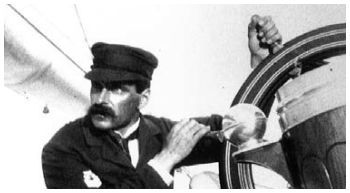
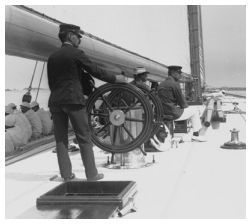
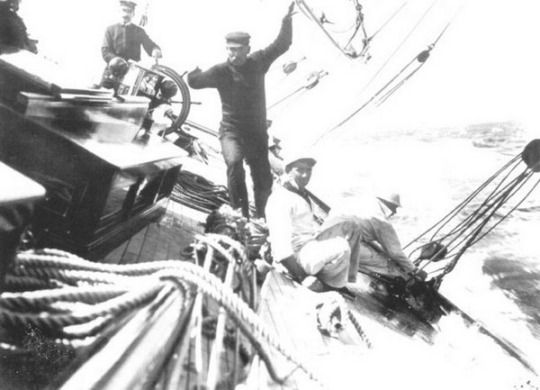
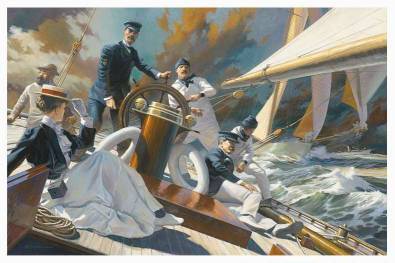
Charlie Barr, arguably Scotland’s most accomplished sporting sailor was born on July 11th 1864 in Gourock.
Charlie was the youngest in a family of noted skippers, whose father, brothers and nephews all won fame racing yachts around the Clyde, the wee guy, he was only 5’ feet tall went on to skipper a yacht to a hatrick of Americas Cup victories, the Americas cup is the oldest sporting competition in the world by the way, and the cup it'self is affectionately known as The Auld Mug!
In 1884, he took a job with his older brother John, delivering a sailing yacht, Clara, to America. Clara’s racing success was such that in 1887, John was selected to skipper the Scottish challenger, Thistle, although his boat was soundly beaten, the noted American Yacht builder and designer Nathanael Greene Herreshoff saw something in the young Scotsman and hired him and Charlie Barr’s yachting career was launched. Charlie Barr would sail Herreshoff designs for much of the rest of his professional sailing life.
Charlie Barr’s determination to win was as legendary as his skills for driving the largest of yachts to the very limit. In 1905, Barr was hired as skipper of the 227-foot, 300 ton schooner Atlantic for the trans-Atlantic race proposed by Germany’s Kaiser Wilhelm II. Half way across, a gale hit the fleet. The big, powerful schooner drove through seas. Water ran ankle deep in the fancy staterooms below deck. Guests hung on for dear life. Atlantic ’s owner, Wilson Marshall, berated Barr, demanded he heave-to. Lashed to the wheel, Barr told Marshall, “You hired me to win…” After Marshall went below, Barr called for more sail. Atlantic won the race, setting a record that lasted nearly a hundred years not being bettered until 1980, another of his records stood till 2002!
At the height of his racing Barr was beating a Yacht called Shamrock, the Yatch, which was rebuilt three times and Called Shamrock II and III respectably were owned by none other than our very own Thomas Lipton.
Charlie passed away 24th January 1911 while visiting Southampton and is buried in the city’s Old Cemetery.
Pics are of Charlie, the second one makes me feel a wee bit sea sick just looking at it.
There is obviously loads more to read up on about Captain Charlie Barr, you can find a four parter here, which sounds long, but isn’t too bad! https://www.classicboat.co.uk/articles/people/charlie-barr-part-one-of-our-series-on-the-greatest-british-racing-skipper-of-them-all/
10 notes
·
View notes
Text
The Crew From Guangzhou: Never Forget A Face
Previously
It was getting more, and more difficult for Smollett to take in his surroundings. The Hispaniola was getting crowded, not just from how many people were engaging in battle on the deck of his ship, but from the bodies stacking up by the minute–Maybe even by the second for all he knew. It might not have mattered that moment, but Smollett couldn’t help the nagging concern of wanting to know just who the hell barged into this disaster. He saw not only men, but several women in more combat-convenient ensembles fighting alongside their crew mates, a sight that only further cemented that any chance these were some kind of hired officials was null. It certainly didn’t go unnoticed by the others, but who were they to argue when those very women stopped a pirate’s cutlass from beheading them or taking a fatal shot from a pistol?
It appeared very clear that they were only targeting Gold Tooth’s crew, and not them... Although, Silver might have been a different story. While Livesey, Trelawney, Jim, Ben and himself were given more than enough backup, Smollett had completely lost track of Silver. Little did he know, the ship cook of the Hispaniola was on a mission of his own. Just like him, Silver wanted answers.
--
Deep down in his gut, Silver couldn’t help but feel a sense of familiarity fighting alongside the Hispaniola’s new allies. It was hard for him to think given how busy he was avoiding swinging swords, flying bullets and narrowly missing getting punched, though. But the second he was able to catch his breath, it was only then he saw a face that he knew he’d seen before.
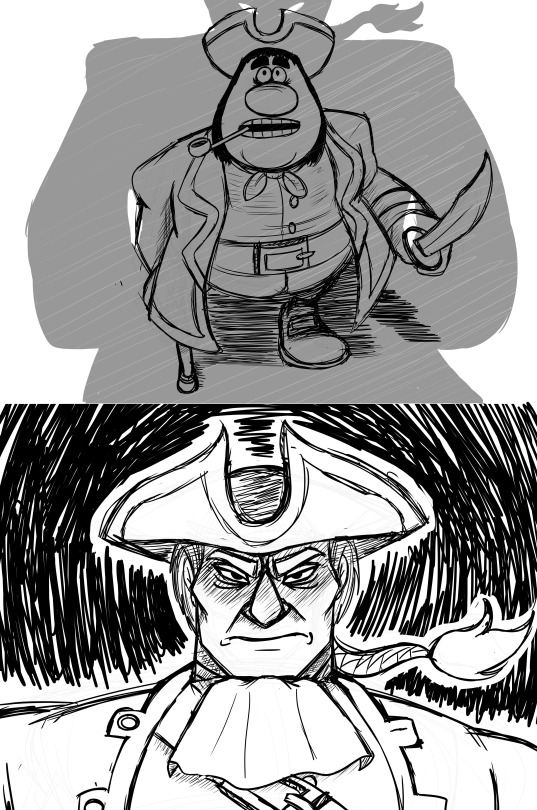
That broad, hulking silhouette; the head of ash gray hair; and that everlasting stoney expression that could suck the warmth out of a whole room…
“Feng Ippuki… I should have known,” Silver smirked once all the dots connected, letting out a low chuckle.
It was short-lived, however, when he realized that the other captain was charging in his direction with his Dao sword drawn at a speed far faster than any old man he’s met. Out of reflex, Silver flinched with his switchblade ready to counterattack, bracing himself to take on a far greater adversary than Gold Tooth–
“Behind you!” Feng barked in a kurt, gravelly tone, rushing straight past the ship cook in order to block an incoming sword strike from the pirate in question.
“Ippuki, you two-faced rat! What the hell are you doing?! This is against pirate code!” Gold Tooth protested, jaw clenched as he fought to hold his blade strong against the other’s.
“Pēi!” Captain Ippuki spat. Using a mere fraction of his brute strength, Feng gave the other a harsh shove, sending him stumbling back and falling flat on his ass. “You know, I originally thought that my crew would be having it out with Silver’s men from everything that I heard, but it looks like fate had other plans.”
“I’ve had enough of all this. You’re not winning this fight! I may be done with the pirate life, but that won’t stop me from cutting down any swine who tries to stop this schooner from reaching Bristol,” Silver swore, his knife clenched tightly in his fist as both he and Feng loomed over their now-common enemy.
The third pirate captain gaped in complete disbelief at the duo, eyes darting between them utterly baffled into silence. That is, until a devilish smirk tugged at the corners of his lips, and he let out a low, dark chuckle.
“You really think they’ll actually keep their word to save you from the noose, Silver? The only way you’re getting out of being sentenced to hanging—” Gold Tooth mocked, finally getting back up onto his feet, “Will be by dying here at sea, skewered at the end of my cutlass!”
Suddenly, Gold Tooth charged forward, sword drawn and loaded pistol cocked. A shot was fired at Feng, the bullet grazing his side and creating a shallow wound, yet the elder caught himself before he could falter from the burning pain in his side. It was purely a distraction, though, only meant to get Feng out of the way long enough for the pirate captain to launch himself at Silver with his sword swinging and full of the intent on dismembering the other. Alas, his plan was for not, as the pirate only got a few teeth knocked out from Silver bashing him in the cheek with his crutch. Gold Tooth’s strategy may have failed, but once he regained his balance, he would see that he was greatly successful in pissing off two very dangerous adversaries that mutually became hellbent on scattering his guts all over the Hispaniola.
“We’ll talk about this later, Silver. Here, don’t make me regret lending you that,” Feng grumbled to his unlikely ally, swiftly tossing a spare sword to him without taking his ever-scowling eyes off of Gold Tooth.
“You’ve got yourself a deal, Ippuki,” Silver agreed coolly, ditching his switchblade in favor of the borrowed weapon.
#treasure island 1988#return to treasure island#ostrov sokrovishch#treasure island oc#treasure island#long john silver#[The Crew From Guangzhou]#[My Art]#[Return To Treasure Island!AU]#[Fanfic]#Jfc I think this is why I don't write fanfiction often.#This shit is messy as hell I'm so sorry!
41 notes
·
View notes
Text
Chapter 51- Sirin
***
With the Leviathan's resurrection, her power had settled again into its familiar cycle: day and night, sleeping and waking. At noon, she sat on the schooner's deck, one leg dangling over the bowsprit, and stared at the sun, remembering the devastation of her power, remembering the unsounded depths of it.
It scraped at her, this binding, this balance. It howled, her grief. Destroyer, destroyer, she told herself, and yearned for shadows.
But that power was driving her fingers deeper into the wound, not sealing it. It was driving her hand into her own chest and tearing out her heart. Nothing healed that way.
Was this voyage to be another wound? As the trim, black-and-yellow schooner cut over the waves, as the seas grew darker and those waves grew colder, Sirin felt dread mount inside her, and the question went unanswered.
"We can still turn around," Luca told her one night on the icy deck. They held teacups close to their faces to stay warm, the sky a canopy of cold, distant stars. The ship that bore them was built by Luca and named, of course, the Hornet. In warmer waters, the sough and snap of the billowing sails was a comforting sound, a friendly presence. Here it chilled the bones; it filled Sirin's nerves, living memory, a constant reminder of their course.
"It's not too late," Luca went on, his voice soft.
Sirin blew a plume of steam off the surface of her tea and shook her head. She stared out past the prow, over the heaving gray shoulders of the sea.
Too late, she thought.
Was sixteen years too late? The last time she had seen Alkona, it was a hazy back-cast glimpse through a porthole, the island wreathed in smoke, a black column rising ever higher into the sky. Then it was fever dreams, and nothing. Only memories had remained, and in their way they had become warped and bruised. Some faded, some sharpened. None of them were right. None of them were real. Whatever else she would find, it would not be her Alkona. Not as she dreamed it, not as she wanted it. Not as she might have made it, deep in the dark throes of the Leviathan's power.
She set down her teacup and let out her breath. Her eyes were warm. Luca reached out, his gloved hand closing over hers.
"It's all right," he told her. "Whichever way. I'll be with you nevertheless."
Sirin didn't reply. Luca sat with her long into the night, the wind growing ever colder, the spray numbing her face. At last, she squeezed his hand.
Go belowdecks, she told him. You're freezing.
"A mere pittance to pay to keep you company."
I despise you.
"Ah, but you're still here. Come with me?"
In a moment.
He nodded, and kissed her knuckles, and retreated below.
Sirin faced the horizon, shaking her hood from her hair and letting the wind play through her curls. She felt those fever dreams pulse at her again. Rock crags, and green, misted slopes, and standing stones. Ancient things, sentinels against the weather. A cave, a darkness deep beneath the earth, and the eyes of grave-dolls glimmering as if watching her. As if waiting.
Watching what? Waiting for what? A lost child, her language, her culture, herself cut away at the roots. Would they remain silent, stolen, gone forever?
She was not that child. She would never be again.
It was too late for her people, too late for her family. What did she hope to find on Alkona's shores besides bones?
Was it too late for her to come home again?
The wind and stars gave her no answers. There was no comfort in the voice of the sea. She clenched her fists, and shadow unfurled around her, a whispering veil, familiar as a lullaby. She let it enfold her. She closed her eyes, and the dark was there, too.
***
Days passed, gray and looming, their nights wild with stars and scattered ice. The Hornet kept its course, traveling north past the distant austere cliffs of the Buyani archipelago, through the thousand islands of the Ork Roads, past nameless, abandoned islets, gray and desolate, crowned with ruins and haunted by seabirds.
Their cries and the distant boom of waves shuddered deep in Sirin's bones long after the schooner passed them by.
By day, she and Luca crewed the ship together; sometimes he sang to fill the silence. Sea-shanties and reaver songs and endless Lapidaean ballads, full of clever wordplay and legendary figures from antiquity Sirin didn't know. Nights they spent huddled round the tiny coal stove belowdecks, warming their hands in turn. Luca had taken to wearing a set of spectacles, and they suited him, his crooked nose and furrowed brow and the untidy gilt gleam of his hair. They made him look older, but Sirin liked them all the better for it. Most nights he read aloud- he'd brought far too many books in a battered old sea-chest- and she listened, curled under a ship blanket, watching the dance of the firelit shadows over the walls.
The cold sharpened day by day, a blade in her lungs with each breath. Luca shivered, but Sirin savored the burn. Too long she'd breathed the muggy southern heat. This was the stark chill she craved.
One morning they spied a pod of sea-orks breaching off the port side, great, glistening backs curving from the dark waves, streaming with spume and snorting gouts of hot steam into the sky. Tusks clashed and clattered, and bellows rumbled through the deck, the sound shivering in her bones. Sirin watched them, and let herself feel the thrill of it, the fragile, living delight of the moment, these bones she lived in, the way all things convened in her to make all things what they were.
"Amazing, aren't they?" Luca said, and Sirin nodded, and meant it.
Three mornings after, she woke in her bunk to a steady ship, and hush. The waves- that was it. They were quiet on the hull. The ship had slowed.
Luca was already on deck, at the wheel. Sirin came to his side. His eyes were narrowed, his blond hair whipped back from his forehead. The headwind was a strong one, bitter with ice. The sea spread dark as ink, seamed with whitecaps. Cloud gulls chased their mast, and Sirin felt her heart seized and stricken, and knew.
An island approached fast on the horizon. Mist veiled its lower slopes, but it rose above, towering into the sky: a vast, broken double-crag, upper ramparts touched with pale sunlight. Sirin's throat tightened. She felt her powers churn inside her, a creature, a scream, longing for night, longing to hide her from its sight.
This sea remembered her, this sky. This island, Alkona. How could it not? It had tasted her blood. It had held her screams, her last screams, echoes ringing off its stones.
She grabbed for the wheel, her fist crushing around one of its pegs. Wood crackled under her hand.
"It's still not too late, Sirin," Luca told her.
She shook her head, hard. No, she thought. She had to see it. She had to know.
They drew toward the island. Mist parted, revealing sheer dark cliffs nested by colonies of countless seabirds, rockfalls and deadly crags. The broad arc of a black-sand beach opened before them, a bay torn like a jagged bite into the south-facing reaches of Alkona's shoreline.
The air tasted clean, rain and salt and bitter, like the memory of old blood on the back of Sirin's tongue.
Luca sailed closer, as close as he dared. Breakers hissed and boomed against the cliff walls, a slow, heartbeat rhythm. The tide was low, and Sirin could see the jagged points of ship-breaking rocks jutting from the water. They would be invisible come high tide, but now, here, the seas were calm. The sunlight glistened on the waves, dappling them with its pale morning light.
Sirin felt her power calm inside her, felt it turn over, and sleep. It would return, as sure as the sun would set, as sure as the moons would rise. For now, it could rest.
Still, she couldn't slow the pace of her heart, couldn't stop her hands from quivering as she and Luca dropped the anchor and readied the skiff.
They rowed in, weaving between the deadly crags. The water was deep green and clear, and Sirin could see through it as if through cloudy glass: beds of ribbon grass and kelp like great whips, caught with motes of phosphorescent algae. The current swirled, a complicated flexion of force and give, a constant, mesmerizing dance. In it, a school of tiny fish flitted past, quick and agile. They flashed silver, then dark, then silver again as the sunlight caught them. Sirin trailed her hand in the water, and they darted away, vanished once more into the depths.
At last, sand scraped the keel. Together Sirin and Luca dragged the skiff up the shore, mooring it well past the tidemark. Sirin straightened, breathing hard. A deep hush rang. The surf, the seabirds, all seemed distant, as if held behind a barrier of mist. The beach shone like polished obsidian, sand carved into ripples by the current.
She expected a wall of memories, unendurable pain. Had she fallen there? Had one of the other children stumbled over that stone, or hidden by that boulder, as if the slavers might lose them in the mist? The blood was gone, washed clean by the tide. The air no longer smelled of smoke. The hush remained.
Sirin lifted her eyes up the sand, up the border of stones at tidemark, up the cliff, patchy with green moss. A sheer wall of dark rock. Sirin made out the island's twin crags. They loomed above the mist like some floating island from a cradle song.
She began forward. Luca hung back.
"You're really going up there?" he said, nodding toward the clifftop.
Yes.
"I can stay here, if you'd rather be alone."
Sirin shook her head. Come with me. Please.
"Of course." He came to her, shedding his gloves before squinting at the cliffside. "Well. Now that looks a delight."
Steps wended down the cliff, dozens of them, near-vertical in places and hacked out by hand. Sirin remembered, all at once, the scrape of her bare, callused feet over stone, the frigid ache of her toes, the burn of her muscles. Most of all, the exhilaration of making the climb in one scramble, full of mad, childish glee.
She smirked. I can go first if you're nervous, Valere.
He bowed with a flourish. "By all means. I do so love making a fool of myself around you."
And I would have it no other way. She touched his cheek. Stay close. It is a long climb, but a longer fall.
She pulled off her boots and slung them around her neck, then left the beach, left the skiff and the sound of waves, and began to climb. At first her muscles shuddered, uncertain of the effort; within minutes, though, her breathing evened, and she remembered the rhythm of the climb. Her hands slipped into holds and niches, worn by centuries of effort. Her feet found the hidden crevices and patches of grit, gaining purchase on the slick stone.
Luca followed, somewhat more ungainly. Sirin couldn't blame him. The steps had been carefully maintained when she was a child, but nearly two decades of storms and merciless wind had warped them out of shape, even collapsed them in places, and the going was slow.
What do you think will be waiting for you, my girl? her grandmother might have said. It was no difficult thing to imagine her climbing at Sirin's side, nimble as one of the goats that ranged like wild spirits over Alkona's peaks. More ruin? More decay? Or nothing at all? That is the way of things, to forget. The storm smooths the mountainside. The tide washes the sand clean. The seas rise, and they fall, and all things go on.
Sirin clenched her teeth. That's not my way.
Then how will you go on?
I must know.
Do you think you will be forgiven?
I must know, she insisted, to her dead grandmother's memory, to herself. It had only ever been herself. I must.
The wind howled, channeled through a pair of rock markers at the clifftop. Sirin scrambled the last few yards, then helped Luca up, standing with him as he doubled over, his hands braced on his knees.
"Triune," he panted, peering over the edge. "You weren't joking. That's a long bloody way down."
Sirin turned her face to the gray sky and listened. Luca straightened with effort; she heard him come to her side. The clouds scudded over the sun, throwing the mountainside into a shifting play of sunlight, shadow. The landscape before her was all jumbled rockfall and spreading green moss, dense and springy, cut with rivulets of clear water from higher on the mountain. No sisi blossoms dotted the moss; the little yellow flowers bloomed in spring, and died by summer's end. She tasted moisture in the air, noted the way the clouds loomed, their depths a pensive gray. Later, there would be rain.
"What is it?" Luca asked.
Sirin shook her head, her throat tight behind her scar. Nothing, she signed. Nothing but silence.
They moved on, feet crunching on loose stones. The steps led them higher. Standing stones swam from the light mist, each no taller than Sirin and marking their own pathways over the mountain. Some bore bullet pits; others simply leaned like tired old women, their bases eroded by time. She touched them as she passed them by, running her hands down their damp, lichen-crusted surfaces. She set her shoulder to one leaning far enough to fall, as if she might push it back into place. She didn't, but it was good to feel the stone, to feel again this ground under her feet, familiar as a song almost forgotten.
The sun emerged from the low clouds. Shafts of sunlight hung through the mist, as if through deep water. One illuminated a humped shape, what Sirin thought for a moment was a huge fallen boulder. Drawing close, she realized her mistake.
Houses. Of course. They stood on a flank of the mountainside, a terraced plateau, a village. Her village. The last time she'd seen this place it was an inferno of flames, of screams, the goats bleating in their pens. Now, it seemed almost peaceful. The beehive huts, made of stacked stone and driftwood, were empty. The fires were out.
She didn't enter the village. She crouched by the path marker and sifted through the dirt, then plucked an object from it: a bone pin shaped like a tiny fish, carved with skill and exquisite detail, its eyes two chips of amber. She cleaned the grime off it and held it to the light.
"It's beautiful," Luca said. "Something of yours?"
Sirin shook her head, bending to bury it again.
"Don't you want to keep it?"
No. It doesn't belong to me.
She straightened and turned from the village. There was nothing here, nothing for her. She lifted her gaze toward the lower of the twin crags, then turned from the village, leaving it once more to the mist.
"Up there?" Luca asked her, quietly.
Sirin nodded, her hands in fists at her sides.
This climb was easier, though each step tightened her breathing, sharpened the spike of her heartbeat. Luca must have sensed it; he slipped his hand over her wrist, his fingers light on her pulse. He said nothing as they ascended, mounting the steps, the world becoming jagged black shale around them, the crags sharp as broken glass.
Sirin knew this walk. She'd made it many times, her arms full of driftwood, or baskets of sisi, or fresh razor grass harvested from the beach. She'd made it with her grandmother before, helping her when she was very young, and then simply keeping her company when she grew old enough to climb on her own.
Nothing to be afraid of, she'd said, the first time she brought Sirin to the cave. She had been three or four, shivering at the thought of this place. The holiness had terrified her. So had the prophet's skull within with its strange whaleglass tongue, its whispers calling her. They had given her such strange dreams.
Witch dreams, her grandmother explained. Like your witch blood. The Leviathan knows you, Sirin, deep in its own dreams. Some say all the world is its dream.
Ghosts live up there, Sirin had said.
And the ghosts know you, too. Your mother is there. My mother with her. All of our beloved dead. You come to remember them. They know that.
Sirin pressed her eyes shut as she crested the steps, holding back tears.
Do they know me, now?
Do they remember me?
Is there more waiting for me than the dead?
Whispers, whispers. Her grandmother's voice in her head, as real as her own thoughts. She had to do this, this last thing. For her lost people, for this place that had not feared the sight of a slaver ship, that had known nothing of the world beyond its kind seas. Valeria had left the battleground; she had left the world behind, in her grief, in the failing of her faith. Now Sirin walked with her own grief, as she had for so long. She didn't know if she could leave it in the dirt, didn't know if she could walk away from it and find what lay beyond. But Sirin's grandmother had been right, and she trusted her now, as she had then, all those years ago.
Don't be afraid, she said. Her voice faded; it quieted. Luca's voice replaced it. "Sirin," he said, soft and reverent.
She opened her eyes.
It rose from the mist.
The crag, like a ship's prow. The cave below, a rough gash in the mountainside. The stone graves, like silent children in the mist.
The wind lifted, ruffling Sirin's hair. A piercing pain coursed through her, white-hot as lightning.
A trace of yellow fluttered in the wind- yellow sisi flowers.
Sirin drew in. Her limbs were numb; her pulse felt far away, far from her body. The wind fell as she climbed through the stone graves, as she knelt before the cave mouth, as she shivered there in its draught.
A grave-doll stood in the broken shale. The sisi flowers had been woven into a little wreath about its neck, not yet torn away by the wind. It was driftwood dried to a silvery sheen, its eyes carved of shell.
Sirin's breath hissed from her. She reached for the grave-doll. Her fingers brushed its driftwood cheek.
How long had it been there? Not long. Whoever had placed it here must have done so before the last of the sisi flowers died, before the end of summer. They had come here. They had carved this doll, weaved that wreath, had placed it on this holy ground.
It was not for the dead this time, but for a fellow lost child of Alkona like her, for the living. For a ghost that might find a way home.
Sirin felt herself shaking. Her heartbeat trembled in her fingertips. She couldn't hold it back any longer. The sob tore its way from her, and she collapsed to her palms, her spine bent, her forehead pressed to the shale. She sobbed there, facing the dirt; she let the tears come. She let them scour her, so many long years of them.
Luca knelt by her and touched her shoulder. She pulled him to her, her arms around his neck, her face pressed to the curve of his neck and shoulder. He was warm, steady and calm, and he didn't let her go, not for a long time. Not until the tears were done and she was empty, able to breathe, able at last to stand again.
***
Later, they lay curled together in the darkness of the Hornet's small single cabin. A single lantern burned, swaying with the movement of the waves. It cast soft amber light over Luca, limning his bare shoulder and chest, the mess of razor scars carving their way through his skin. Propped on an elbow, looking down at him, Sirin traced them. She traced the line of his arm, the curve of his wrist. Each finger, one by one.
He watched her, his gray eyes glinting under his lashes.
Sirin lifted her hands. What?
"It's good to be here, that's all. Good to be with you."
Beautiful fool.
"Even the nose?"
She ran her thumb down its crooked bridge. Especially that. Like I told you, Valere. It makes your face more interesting.
"How could I forget." He paused, shifting on the bunk. With an exaggerated sense of ease he folded an arm behind his head. His untidy hair spilled into the lamplight, golden waves glistening. "I do hope it might be something you'd be willing to look at most every day."
Meaning?
"I don't know what's going to happen, to me, to Lapide. I can't...I can't claim I'll get it right. But I do know we have a chance, you and I."
Are you a prophet now, making promises of the future?
"Only one." He paused, his smile fading. "That I love you. That I always will. Not much of a vow, I know. But I've heard worse."
Sirin had, too. Once, she knew, that vow might have placed a crown on her head, might have made her queen of the country she'd once been victim to, and which had been her victim in turn. She remembered her dream of herself beneath the cedars, Luca at her side, watching their children play in the sunlight. To be queen of Lapide, the witchborn queen, dressed in blue.
It was only ever a dream. That was not what she wanted, and not what Luca wanted, either. He knew that as well as she did.
She turned her head to the side, considering. Promise me a ship of gold.
"I can...paint one gold."
She let out a silent laugh. That's it?
"It's in your favor, Sirin. Gold is far too dense a metal to make a decent ship. All you'd be sailing is the seabed."
I made a promise too, once, to you. She touched his hair, letting it spill through her fingers. Do you remember?
"Yes."
I promised I would be the one to kill you. I promised I would see your blood on my hands, before the end.
"And?"
And?
"Will you swear to see your promise through as well as I have?"
Close your eyes.
He did. Sirin watched him, watched the lanternlight play over his face. She listened to the gentle rhythm of his breathing.
She pressed her fingertips to his throat.
A wisp of shadow unfurled against Luca's skin. His pulse spiked, but he didn't move. Sirin let her fingers fall, and replaced them with her lips. She kissed the side of his throat, softly, then his cheek. His lashes brushed her face as he opened his eyes again.
Maybe, Sirin signed.
"Maybe what?"
Lapide can never be my home. Not truly. But I love you, Valere. And my answer, to you, is maybe.
Luca nodded, then shrugged. "I've faced worse odds."
We both have.
"And here we are."
Unlikely. Yet I cannot complain.
"Can't you?"
She bent, and kissed him. It is good to be here with you, too.
A hint of Luca's smile returned as he brushed a curl from her face. "It's a fine enough place to begin."
Sirin stayed with him until he fell asleep, then wrapped herself in a blanket and slipped up the ladder to the deck.
Alkona was a great dark crag cut out against the stars, a vast looming presence like a sleeping creature. The clouds drifted, dense and heavy, the tang of approaching rain sharp on Sirin's tongue. She crossed to the bow and leaned against the railing, watching the play of the running lamps over the waves, turning their peaks clear and green.
She set her eyes on the horizon.
A spark rose in her, wild and strange. It arced through her cold as the wind, a desire so vast it was close to sorrow. The first raindrop touched her cheek. She barely felt it. The rain spoke softly against the deck. It wreathed Alkona in haze, a specter glimpsed through mist.
She spread her arms and let her shadows unfurl, reaching to douse the running lights, reaching to the waves, to the fathoms below, upwards toward the stars and the empty night between them, to the line where the stars met the sea and were drowned in it. She willed it with all of her power, so hard it hurt. A glimpse, a sign.
Come back, Sirin urged. Come back to us.
The horizon remained dark. No flare of blue, no swell of light.
Sirin let out her breath, settling her hands on the icy gunwale. Her shadows released, chasing back to their right place. The stars shone past the clouds. The rain quieted to a whisper on the surface of the sea. She wouldn't see it tonight. Maybe she would never see it again.
It didn't matter. It was out there. The stars turned. The seas rose and fell with the moonset. As the world lived and died, so would the whale that swam it into being, whose life and death meant it would go on turning.
It was here, too, a part of her as much as she was a part of it. It was with Luca, by whose side she would soon go and sit, so he might not be alone when he woke up. It was with her power, the cycle of it unceasing. It was with her, she who had not abandoned herself, who against all odds had come back.
Sirin had walked one path for so long, sure it would end in dust, a lonely death in a lonely place. Now that surety was gone, and the sea spread before her. The world to come was full of pain, perhaps, but full of mercy, too. Both were infinite, in the great and terrible balance of all things.
Whatever came, only one truth was certain.
The Great Leviathan would return.
#grave of the great leviathan#tales of the great leviathan#fantasy fiction#original fiction#serial novel#chapter 51#books of the great leviathan
5 notes
·
View notes
Text
Six of Crows Reread🪶
Chapter 41: Matthias
“Two … one …”
Matthias saw Nina’s pupils dilate. Her lips parted, and she pushed past him, stepping down from the tank. The air around her seemed to crackle, her skin glowing as if lit from within by something miraculous. As if she’d tapped a vein of Djel directly, and now the god’s power flowed through her.
Matthias’ initial reaction to seeing her on Jurda Parem
Annnnd she just made the other Heartrenders eyes explode….
Is that grosser than Kaz ripping out an eye or about the same..?
Nina glided towards the soldiers. Matthias moved to protect her as he saw rifles raised. She lifted her hands. “Stop,” she said.
They froze.
“Lay down your arms.” As one they obeyed her.
“Sleep,” she commanded. Nina swept her hands in an arc, and the soldiers toppled without protest, row after row, stalks of wheat felled by an invisible scythe.
The air was eerily still.
Incredible.
Terrifying.
FYI I’d be a heartrender if I were grisha
“Go!” Matthias shouted at them. “Please! You—”
Brum lifted his gun and fired. The bullet struck Matthias directly in the chest. The pain was sudden and terrible – and then gone. Before his eyes, he saw the bullet emerge from his chest. It hit the ground with a plink. He pulled his shirt open. There was no wound.
It’s too bad she can’t manage this a second time in Crooked Kingdom—
Ha… hahaha *crying*—
“Nina,” he said, hand still pressed over the smooth skin on his chest where a bullet wound should be. “Nina, please.”
“You know they would not offer you mercy, Matthias.”
“I know. I know. But let them live in shame instead.”
She hesitated.
“Nina, you taught me to be something better. They could be taught, too.”
Nina shifted her gaze to his. Her eyes were ferocious, the deep green of forests; the pupils, dark wells. The air around her “seemed to shimmer with power, as if she was alight with some secret flame.
“They fear you as I once feared you,” he said. “As you once feared me. We are all someone’s monster, Nina.”
I forgot this was a Matthias quote-
Wow I’m actually so angry that he ends up dying
He wanted a second chance for his brothers and they just kill him….
Nina probably should’ve at least killed Brum
The Elderclock chimed on unheeded as the schooner vanished into the vast black shelter of the sea, leaving only suffering in her wake.
First | Previous | Next
#six of crows#matthias helvar#nina zenik#kaz brekker#inej ghafa#wylan van eck#jesper fahey#grishaverse#shadow and bone#soc#crooked kingdom#reading#books#leigh bardugo#kazscrows#kazcrowsreadssoc
18 notes
·
View notes
Text
Before Deluca -- into the unknown
Being that the sun was high, I took the task of checking on what precisely we ran into, and made it off the bed before I was interrupted.
“Wait,” Lucient called too strained, too worried, “I hear sea breeze…”
I did as well, but that wasn’t strange and I said as much, “What else would you hear, my dream, we are at sea.”
Even narrowed, even annoyed, his eyes sparkled, “In my thoughts, treasure. I believe we hit the Isle,” crawling to the end of the bed, he pulled me close, hugging my waist, and aimed those beautiful eyes up at me, “Tread lightly, make no sudden moves, and say nothing.”
“You’re frightened,” I didn’t mean to smile, hadn’t realized I did, but the pinch in his face said I had, “I’m sorry, love,” I soothed, petting his hair, smiling again with how he pressed into my hand. “I’ll be careful.”
“Yes, you will,” he warned, climbing his hands up to yank me into a bend, kissing me far too deep—leaving me gasping when he pulled away—and he smiled, “You’re mine, and I forbid you from dying.”
Dying? Massive though she is, she seemed docile enough, I fretted, forgetting how he listened—how he all but lived in my thoughts.
“She grows violent when startled,” he explained, without explaining, “so don’t startle her.”
“Startle her?” Ludicrous the very idea, and my voice got away from me as I told him so, “She’s a mountain with teeth!”
He laughed and spun me around, slapping my backside to motivate me—and by the grin I caught when I turned; to tease—before suggesting, “Peek, treasure, only peek. But, if you think you can manage it...maybe scavenge some of the sun-shield you made so I might leave this room?”
I waved him off, nodding at his request and headed out on deck.
And into fresh horrors. Half the schooner was submerged in rippling seawater, the main mast cracked but not fallen. Yet something behind, beside, and a peek over the railing showed below, was swaying—splashing evermore water onboard. That something stretched too great a distance behind the boat, sinking into the murky depths of the ocean. Longer and wider than the schooner—at least four times the size of the Lune Royale from what I could see of it—it was black as pitch against the greenish blues of the sea and reminded me of the shark. Of its tail, in shadow, as it circled.
I sidled the cabin walls, scooting with slow steps through rising waters to see what waited in front of us—what we hit. Immediately I wished I hadn’t.
No, I did not find that terrifying face with its fiery eyes waiting for me. Instead I was greeted by what speared our hull; a barrier of craggy black rocks tangled in thick, pulsing roots that led up to an impossible line of trees. Impossible in too many ways, those trees. I could see a curve to the right and left of me suggesting it rounded at its edges, but the distance from me to those edges was too great to gauge.
I have visited the mountainous redwoods of California since that time, and can say with absolute certainty that the trees on the Wandering Isle were grander in height and thickness. Although not all were so wide and braided—ropes of throbbing bark tangled and spiraling to shape their massive trunks and branches—as those at the barrier, some were quite thin, others shapely and curved in a confusing manner.
But size and distance were not what froze me. Those trees were pale white, visibly pulsing and their leaves, dangling and swaying in the calm ocean breeze...bled. Thick, red, viscous liquid dripped from every leaf and poured in thin rivers from between the trunks, running down the rocks to paint the seawater surrounding them.
The Isle’s face had to be in there somewhere, I was certain—fearful—but from the schooner I could see only those worrisome trees. And those trees sang, with scent and sound they sang. They whispered to me, wordless but gentle, and somehow giddy. The scent however, that urged my feet closer, my hands slipping from the cabin walls. I never smelled something so sweet. Not in flowers, not in food, but it held a hint of what I’d recently found much sweeter than both; blood.
Treasure, is it the Isle? Lucient asked my mind, and I fed him what I could of the sights before me, receiving but one more message, return to me.
I did, without question—but far too much hesitation, not wanting to leave the song of those trees.
The sun-shield was lost to the sea, floating too far to grab without risking a swim—and with that thing swaying I wouldn’t. But there were sails close enough to wrench free, and surely they would be thick enough to protect him. I took the smallest one I could reach, cracking the mast with the force of my pull on it before folding it and folding it until I could carry it to the cabin.
Lucient was standing in the open door when I turned towards it, “Another ship lost,” he told the half-sunken schooner.
“But we may not be,” I attempted cheer and he pinched up his face at me. Before he could follow the look with any needling reminders of how hopeless our situation was, I draped the sail over him and scooped him into my arms.
“And where do you think you’re taking me,” he asked through the sail, voice unhindered by its thickness, “to that dreadful wood?”
“Yes, my love,” I said, sidling the cabin again, careful of the rising water, “I see little choice and this is that Wandering Isle, isn’t it? Perhaps she’ll swim around to somewhere near civilization.”
He sighed hard enough to puff the sail, “She avoids such places, treasure.”
“Well, with all you know about her,” I stopped at the bow, a hop away from the oozing red grass that grew over those craggy rocks. The whispers welcomed me, called to me, as did that delicious scent, but still I waited, “is there anything on her island we should worry of?”
Lucient remained quiet for too long, but his mind shared what held his tongue; the whispers, the scent. I checked behind us as I waited for him to speak, groaning at how much the water had eaten while we stood there.
“I’ve never been on her island,” he said finally, “I know stories, treasure, that is all. Before...before that night we lost the Lune Royale I—I had never seen her up close.”
“Into the unknown it is then,” I said and, though he couldn’t see it, I smiled, “at least we’ll be together.”
#writeblr#snippet#writing#novel#before deluca#that song is in my head now damnit#is it wrong to post scenes i am currently writing while i have older ones queued up#probably#will that stop me#no
1 note
·
View note
Text
"Captain Crimvaren, ma'am," the cabin boy, Jim, huffed out. The youth was in a panic and scared, it read from his heavy breathing to wide darting eyes, and his pallid complexion.
"Take a breath Jimmy," Rain said as she stood up, her smoky voice soothing in tone. "What has you in such a state?" She asked, tightening the belt of her breaches after tucking in her tunic.
"Ma'am, the sky is strange….you have to see this, maam." The youth calmed enough to speak clearly.
"Then I'll have a look" she walked past the boy tousling his shaggy hair. She set up her boots next to the door and remained barefoot. After a brief glance at the ornate long coat she pulled the tricornered hat on to shade her eyes as she went out on deck.
On the deck there was dead silence, no one calling for sail work or rigging adjustments. Also missing was the sound of the sails snapping in the wind. There was the creek and groan of the rigging as the schooner bobbed.
"Are we in the doldrums Mr Hawk?" Rain asked, approaching the helm, snapping her fingers in front of the man's face when he didn't answer.
She finally turned to look at what had the crew so stunned to not answer their captain. The sea was still like glass and reflected the deep purple sky and maroon horizon of the sunset. There were however three moons in that sky, one full and two crescent. The crescent moons framing the full, giving the appearance of an eye.
"Jim" Rain said, pressing a key into the youth's hand, "give Skillet a sip of rum then help him distribute it to the others."
"Captain" the boy nodded, then from the stairs to the main deck "where are we, Captain?"
"Well off the map young Jim, well off the map." Dismissing Jim from her thoughts, Rain went to the rail and scanned the aft horizon.
3 notes
·
View notes